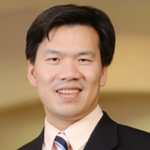Dermatologist’s Journey Inspires Generous Scholarship Support
This story was published in the March 2024 issue of The Philanthropist, a newsletter for supporters and friends of Northwestern University Feinberg School of Medicine. Read past issues here.

For Will Ting, ’99 MD, ’99 MBA, a first-generation immigrant, the cost of tuition and available financial aid were key factors in his school choice.
Now, as a successful dermatologist in charge of his own practice in San Ramon, California, Dr. Ting is an ardent supporter of scholarships and medical education programs at his medical alma mater, Northwestern University Feinberg School of Medicine.
Will Ting was 12 when his parents emigrated from Taiwan to the San Francisco Bay Area in California, where he and his family found themselves up against language and financial barriers. He attended the University of California, Berkeley, on scholarship, and earned his bachelor’s degree in electrical engineering and computer science.
“We came to this city with two luggage bags and a dream,” he said of his family’s immigration to the United States.
He took this ambitious spirit to Northwestern University, where he graduated from the dual MD/MBA program in 1999. He went on to complete his dermatology residency at the University of Iowa, then returned to the Bay Area, where he established his own practice. He credits Northwestern with positioning him for success.
“I owe most of what I have to the University, for giving me an opportunity to receive a top-notch medical education,” Dr. Ting said. Now, he pays it forward.
Over the last decade, Dr. Ting and his wife, Flora, have donated substantially to scholarships for Feinberg students. The Tings have given generously to the Jack Snarr Scholarship, in recognition of the former dean for student programs from 1968–2004 and Dr. Ting’s beloved former medical school mentor. In 2020, the Tings established the William W. Ting, MD and Flora H. Ting Scholarship, through which they support a medical student.
Dr. Ting said he wanted to be part of the movement to make medical school at Northwestern tuition-free.

“I don’t want the expense of education to hold them back from attending Northwestern,” he said. And, he added, “I think [free tuition] will allow us to recruit the best students in the country.”
The Feinberg School of Medicine hopes to someday provide full tuition support to all of its medical students, which will require quadrupling the current endowment. Today, the Feinberg School of Medicine’s scholarship endowment is $251.2 million, with 66% of medical students receiving scholarship assistance thanks to thousands of donors who have made outright and estate gifts.
The Tings have also made gifts to support the Institute for AI in Medicine (I.AIM) and the Center for Medical Education in Digital Healthcare and Data Science. Both entities aim to establish the medical school as a leader in the development and use of new technologies such as wearable sensors, telemedicine, and interoperable health data.
“We have a number of students who are children of immigrant families and several who are first-generation college students,” said Marianne Green, MD, the Raymond H. Curry, MD, Professor of Medical Education and vice dean for Education. “Will and Flora Ting are making a real difference for these and many other students who benefit from their generosity. It is a tremendous gift to take the pressure of financial concerns away from students who can then focus on the real work of becoming exceptional physicians, like Dr. Ting. Their giving is truly inspirational, and we are moved by stories like these that impact our students.”
For more information about supporting scholarships, please contact Larry Kuhn at larry-kuhn@northwestern.edu or 312-503-2417.